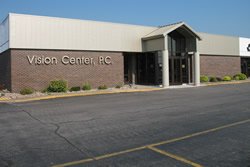By Clayton Kirk, M.D.
 Diabetic retinopathy is the leading cause of vision loss in working-aged people in the U.S. It’s a complex disease that can lead to irreversible vision loss.
Diabetic retinopathy is the leading cause of vision loss in working-aged people in the U.S. It’s a complex disease that can lead to irreversible vision loss.
Diabetes affects the retina, a fine layer of tissue lining the inside of the eye. It’s responsible for accepting light that enters the eye and turning it into images the brain understands.
The retina requires oxygen, which is carried in blood and travels through tiny pipes called retinal blood vessels. Diabetic retinopathy is like having a plumbing issue. Uncontrolled high blood sugar in people with diabetes leads to a malfunction of these pipes, causing them to become blocked and leaky.
How do you know if you have early diabetic retinopathy? You may have distorted and blurry vision. If your pipes burst, it can lead to bleeding in the retina. Damaged pipes are also leaky. When these pipes leak, the surrounding retina absorbs this fluid like a sponge; it swells, leading to distorted and blurry vision.
Over time, large sections of the retina don’t receive adequate blood flow. The body sends out a signal, telling the blood vessels to sprout new blood vessels. While this sounds good, these new blood vessels are small, fragile, and grow in the wrong direction. They can break easily, causing blood to spill into the center part of the eye, making it very difficult to see. More like looking through a glass of milk rather than a glass of water.
As these new blood vessels grow, they become scars on the retina. Like scars on our skin, they shrink, contracting and distorting the surrounding retinal tissue. These scars can pull on the retina if severe enough, and this can lead to a retinal detachment. You don’t want this to happen.
As a person with diabetes, you play a crucial role in managing your condition and preventing diabetic retinopathy. Tight control of blood sugar, blood pressure and cholesterol levels is critical. See your eye doctor at least once a year to maintain your best vision.
There are many treatment options for diabetic retinopathy including injections and laser procedures done in the office or surgery for more advanced cases.
If you experience any changes in vision, especially if you’re diabetic, see your eye doctor immediately.
BIO: Dr. Clayton Kirk completed a retina fellowship and is certified by the American Board of Ophthalmology. He practices at Eye Surgeons Associates’ Bettendorf and Rock Island offices. See our Diabetic Eye Care page for more information.
The material contained in this article is for informational purposes only and is not intended to be a substitute for professional medical advice, diagnosis, or treatment. Always seek the advice of your physician or other qualified health care provider.




